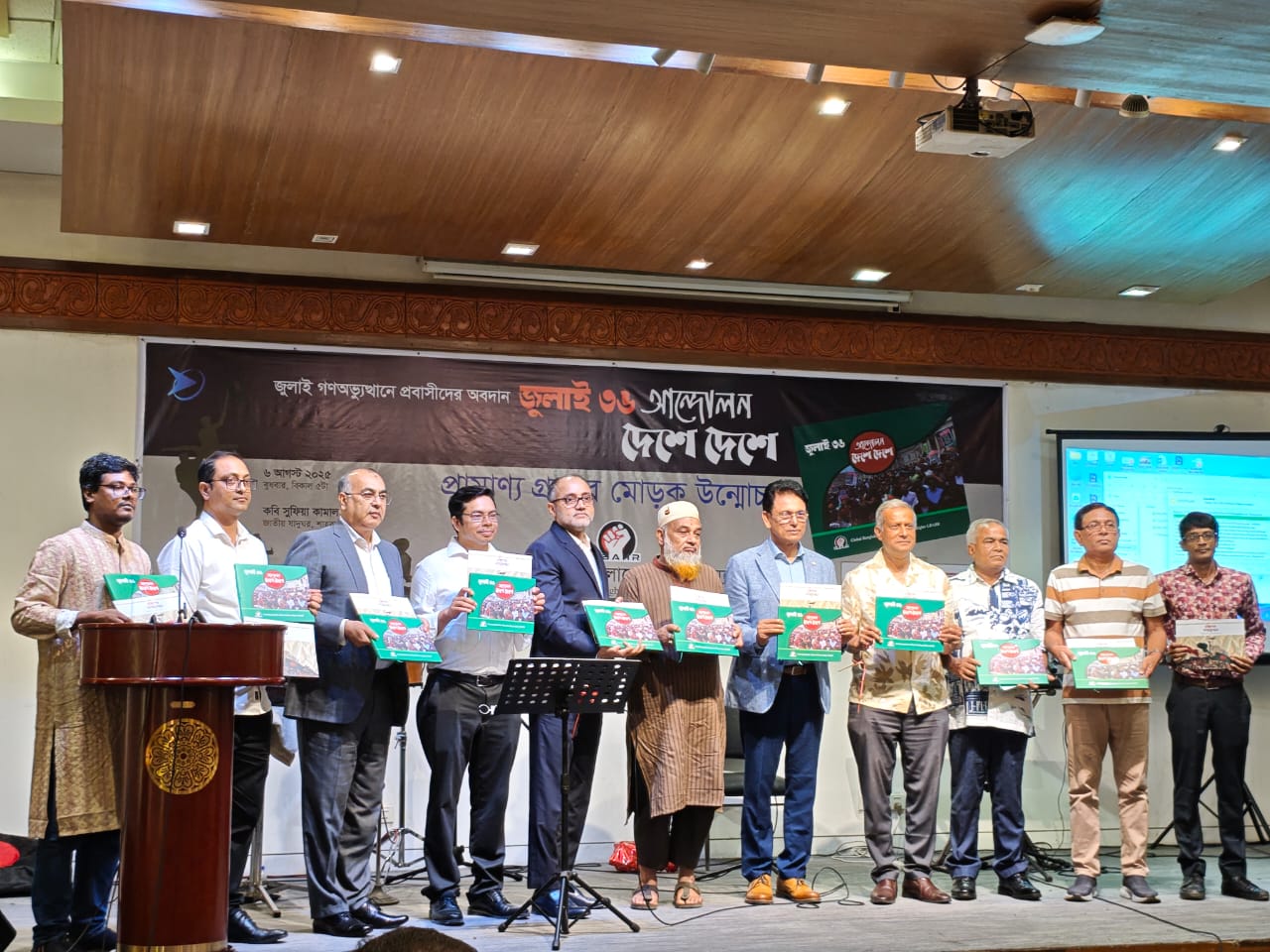News Flash
News Flash

DHAKA, Aug 6, 2025 (BSS) – Two documentary books chronicling the contributions of expatriate Bangladeshis to the July 2024 mass uprising were formally unveiled today.
Mir Mostafizur Rahman, father of martyr Mir Mahfuzur Rahman Mugdho who sacrificed his life during the July uprising, formally launched the books.
UK-based Global Human Rights Alliance for Bangladeshis Abroad (GHAHR) arranged an event on the occasion of unveiling the books on “July 36 Movement Across Nations” and “The 2024 People's Uprising in Sylhet: July–August Phase” at the Poet Sufia Kamal Auditorium of the Bangladesh National Museum.
These volumes compiled historic narratives, images, testimonies, and documentary accounts of the diaspora’s involvement in the democratic movement that swept across Bangladesh and beyond.
Speaking on the occasion, speakers called for formal recognition of the critical role played by expatriate communities across the globe during the movement.
They noted that during the July–August protests, solidarity demonstrations took place in countries including the United Kingdom, United States, France, Japan, Germany, South Korea, Switzerland (Geneva), Norway, Hungary (Budapest), Egypt (Cairo), Belgium, Nepal, Malaysia, and other countries by Bangladeshi nationals living there.
GHAHR Convener and Spokesperson Shamsul Alam Liton emphasized the significance of preserving the memory and documentation of diaspora activism, noting that many faced attacks, legal action, and exile due to their involvement with the movement.
Renowned photojournalist and TIME Magazine’s “Person of the Year” Dr. Shahidul Alam, Special Assistant to the Chief Adviser on ICT and Telecom Mr. Fayez Tayeb, Gono Odhikar Parishad President and former DUCSU VP Nurul Haque Nur, AB Party Secretary General Barrister Fuad Abdullah, and political analyst Dr. Zahedur Rahman were present as key speakers.
They also echoed the demand for honoring diaspora’s contributions and supporting families of the victims of July Uprising and activists who suffered repression.
Mir Mostafizur Rahman, father of martyred Mugdho, offered emotional remarks, urging the nation to preserve the legacy of those who laid down their lives for justice.
Speaking at the program Barrister Nashit Rahman said, it's crucial to documenting the events of the July uprising, otherwise the history will be manipulated like previous movements.
“We are vulnerable and easily forget our past. We forget the history of 1971 and the struggles we had afterwards. We now must document the struggle we did in 2024 from all the aspects and perspectives it had.”
Barrister Shibli Sadique said, “Fascism does not emerge overnight. One of the key ingredients for the rise of fascism is the indifference of citizens. Our indifference gave birth to this fascism. Therefore, we believe that this celebration should not be confined to mere formalities.”
Demanding recognition for the Bangladeshi diaspora living abroad, he said, Bangladeshi people living abroad played a crucial role not only during the movement but also over the whole rule of fascist. They played a major role in maintaining the country's economy.
Representing various diaspora and rights groups, GHAHR Senior Fellow Rupom Razzak, retired Major and researcher AKM Zakir Hossain, Barrister Iqbal Hossain, and Malaysian community organizer Mahbub Alam Shah also spoke, sharing firsthand experiences of organizing protests abroad. The discussion was moderated by GHAHR’s Joint Convener Barrister Zakir Hasan.
Faculty members from Atish Dipankar University were also present at the event, including Dr. Ehsanul Haque Milon, Director of Edust Skill Development (SDI); A. M. Saeed, Chairman of the Law Department; Dr. Ashis Kumar Bhattacharya, Chairman of the EEE Department; Dr. Mosharaf Hossain, Chairman of the Agribusiness Department; Majid Ishtiaq Ahmed, Chairman of the Robotics and Automation Department; and Journalism and Media Studies Coordinator Zubair Ahmed were present among others.
People from abroad also joined the function virtually and shared their experience.
The program concluded with cultural performance by popular music band Nakshi Katha, led by singer Sajed Fatemi. Their song “Muktir Mandire Sopano Tole Koto Pran Holo Bolidan” moved the audience as a tribute to the sacrifices made during the movement.